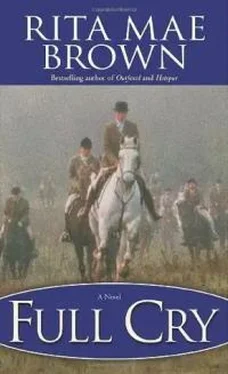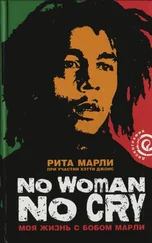Table of Contents
Title Page
Dedication
Praise
CHAPTER 1
CHAPTER 2
CHAPTER 3
CHAPTER 4
CHAPTER 5
CHAPTER 6
CHAPTER 7
CHAPTER 8
CHAPTER 9
CHAPTER 10
CHAPTER 11
CHAPTER 12
CHAPTER 13
CHAPTER 14
CHAPTER 15
CHAPTER 16
CHAPTER 17
CHAPTER 18
CHAPTER 19
CHAPTER 20
CHAPTER 21
CHAPTER 22
CHAPTER 23
CHAPTER 24
CHAPTER 25
CHAPTER 26
CHAPTER 27
CHAPTER 28
CHAPTER 29
CHAPTER 30
CHAPTER 31
CHAPTER 32
CHAPTER 33
CHAPTER 34
CHAPTER 35
CHAPTER 36
CHAPTER 37
CHAPTER 38
CHAPTER 39
CHAPTER 40
CHAPTER 41
CHAPTER 42
SOME USEFUL TERMS
Copyright Page
Dedicated to Marion Maggiolo of Horse Country. Foxhunters would be naked without her. Now that would scare the foxes!
Praise for the novels of Rita Mae Brown
Hotspur
“A dashing and vibrant novel . . . The author portrays the hunt family with such warmth and luxury of detail, one feels a friendship with each and every character, animals included. The reader will romp through the book like a hunter on a thoroughbred, never stopping for a meal or a night’s sleep.”
—Publishers Weekly (starred review)
“Brown combines her strengths—exploring southern families, manners, and rituals as well as the human-animal bond—to bring in a winner.”
—Booklist
Outfoxed
“A rich, atmospheric murder mystery steeped in the world of Virginia foxhunting . . . Rife with love, scandal, anger, transgression, redemption, greed, and nobility, all of which make good reading.”
—San Jose Mercury News
“Compelling . . . Engaging . . . [A] sly whodunit . . . A surprise finish.”
—People
CHAPTER 1
A bloodred cardinal sparkled against the snow-covered ground. He’d dropped from his perch to snatch a few bits of millet still visible by the red chokeberry shrubs scattered at the edge of the field. The snow base, six inches, obscured most of the seeds that the flaming bird liked to eat, but light winds kept a few delicacies dropping, including some still-succulent chokeberry seeds.
Low gunmetal gray clouds, dense as fog in some spots, hung over the fresh white snow. In the center of this lovely thirty-acre hayfield on Orchard Hill Farm stood a lone sentinel, a 130-foot sugar maple. Surrounding the hayfield were forests of hardwoods and pine.
Two whitetail deer bolted over the three-board fence. Deer season ran from mid-November to January 2 in this part of Virginia. Those benighted humans who had yet to reach their legal bag limit might be found squatting in the snow on this December 27, a cold Saturday.
Bolting across the field in the direction opposite the deer came two sleek foxhounds. At first the cardinal, now joined by his mate, did not notice the hounds. The millet was too tasty. But when the birds heard the ruckus, they raised their crests and fluttered up to the oak branches as the hounds sped by.
Before the birds could drop back to their feast, four more hounds raced past, snow whirling up behind their paws like iridescent confetti.
In the distance, a hunting horn blew three long blasts, the signal for hounds to return.
Jane Arnold, Master of Foxhounds for the Jefferson Hunt Club, checked her advance just inside the forest at the westernmost border of the hayfield. The snowfall increased, huge flakes sticking to the horse’s coat for a moment, to her eyelashes. She felt the cool, moist pat of flakes on her red cheeks. As she exhaled, a stream of breath also came from her mount, a lovely bold thoroughbred, Rickyroo.
Behind her, steam rising from their mounts’ hindquarters and flanks, were fifty-four riders. Ahead was the huntsman, Shaker Crown, a wiry man in his middle forties, again lifting the hunting horn to his lips. The bulk of the pack, twenty couple—hounds are always counted in twos or couples—obediently awaited their next order.
Sister cast her bright eyes over the treetops. Chickadees, wrens, and one woodpecker peered down at her. No foxes had just charged through here. Different birds had different responses to a predator like a fox. These creatures would have been disturbed, moved about. Crows, ravens, and starlings, on the other hand, would have lifted up in a flock and screamed bloody murder. They loathed being disturbed and despised foxes to the marrow of their light bones.
On Sister’s left, a lone figure remained poised at the fence line. If Shaker moved forward, then the whipper-in, Betty Franklin, would take the old tiger trap jump and keep well to the left. Betty, a wise hunter, knew not to press on too far ahead. The splinter of the pack, which had broken now, veered to the right, and the second whipper-in, Sybil Hawkes, was already in pursuit well away across the hayfield.
Whether Sybil could turn the three couple of hounds troubled Sister. A pack should stay together—easier said than done. Sister blamed herself for this incident. It takes years and years, decades really, to build a level pack of hounds. She had included too many first-year entry—the hound equivalent of a first grader—in today’s hunt.
First-year entry sat in the kennels for Christmas Hunt, which had been last Saturday. Christmas Hunt, the third of the High Holy Days of hunting, overflows with people and excitement. Both she and her huntsman, whom Sister adored, felt the Christmas Hunt would have been too much for the youngsters. Today she should have taken only one couple, not the four included in this pack. Shaker had mentioned this to her, but she had waved him off, saying that the field wouldn’t be that large today, as many riders would still be recuperating from the rigors of Christmas. There had been over one hundred people for Christmas Hunt, but she had half that today, still a good number of folks.
The hounds loved hunting in the snow. For the young entry this was their first big snow, and they just couldn’t contain themselves.
She sat on Rickyroo who sensed her irritation. Sister felt a perfect ass. She’d hunted all her life, and, at seventy-two, it was a full life. How could she now be so damned stupid?
Luckily, most people behind her knew little about the art of foxhunting, and it was an art not a science. They loved the pageantry, the danger, the running and jumping, its music. A few even loved the hounds themselves. Out of that field of fifty-four people, perhaps eight or nine really understood foxhunting. And that was fine by Sister. As long as people respected nature, protected the environment, and paid homage to the fox—a genius wrapped in fur—she was happy. Foxhunting was like baseball: a person needn’t know the difference between a sinker and a slider when it crossed home plate in order to enjoy the game. So long as people knew the basics and behaved themselves on horseback, she was pleased. She knew better than to expect anyone to behave when off a horse.
She observed Shaker. Every sense that man possessed was working overtime, as were hers. She drew in a cold draught of air, hoping for a hint of information. She listened intently and could hear, a third of a mile off, the three couple of hounds speaking for all they were worth. Perhaps they hit a fresh line of scent. In this snow, the scent would have to be fresh, just laid from the fox’s paws. The rest of the pack watched Shaker. If scent were burning, surely Cora or Diana, Dasher or Ardent would have told them. But then the youngsters had broken off back in the woods. Had the pack missed the line? With an anchor hound like the four-year-old Diana, now in her third season, this was unlikely. Young though she was, this particular hound was following in the paw prints of one of the greatest anchor hounds Sister had ever known, Archie, gone to his reward and remembered with love every single day.
Читать дальше












